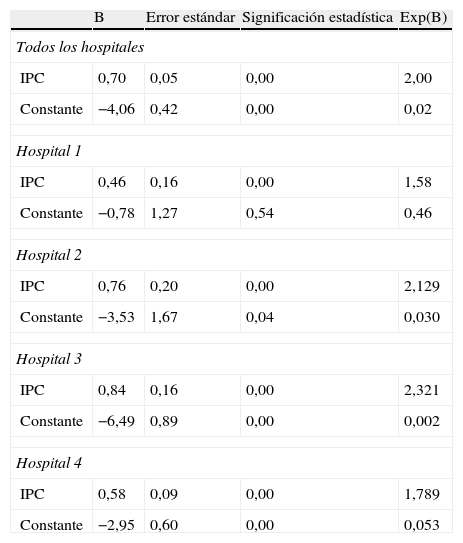Conocer el grado de implementación de un modelo de personalización de cuidados en 4 hospitales del Servicio Andaluz de Salud y determinar si existe relación entre este modelo y la percepción de confianza en la enfermera por parte del paciente.
MétodoEstudio transversal, que incluyó a pacientes dados de alta durante 12 meses en unidades de 4 hospitales públicos organizadas según el modelo de Personalización de Cuidados del Servicio Andaluz de Salud (basado en el modelo Enfermería Primaria). La implementación del modelo se evaluó mediante el Índice de Personalización de Cuidados (IPC), tipo informe de usuario, y la percepción de confianza mediante una pregunta realizada simultáneamente con el IPC. El análisis incluyó estadística descriptiva, test de Chi cuadrado, regresión logística simple y multivariante, estratificando y sin estratificar por unidades hospitalarias.
ResultadosSe incluyeron 817 pacientes. La implementación del modelo de personalización de cuidados osciló entre el 62 y el 79%. El valor del IPC presenta una fuerte asociación con la percepción de confianza del paciente en la enfermera: por cada aumento en un punto del IPC, la probabilidad de percibir confianza aumenta entre un 50 y un 130% (0,12<r2>0,58).
ConclusiónLa implementación del modelo a estudio se realizó en un porcentaje bastante alto en las unidades quirúrgicas y aceptable en las unidades médicas. Se ha constatado la influencia de la personalización de los cuidados, medida mediante el IPC, sobre la confianza que el paciente tiene en la enfermera que lo cuida. Esta confianza es la base de una relación terapéutica.
To determine the level of implementation of an inpatient personalized nursing care model in four hospitals of the Andalusian Health Service, and to determine if there is an association between this model and the perception of trust in the nurse by the patient.
MethodAn observational cross-sectional study included the patients discharged during a period of 12 months from hospital wards that used the Inpatient Personalized Nursing Care Model of the Andalusian Health Service (based on Primary Nursing Model). The level of implemention was evaluated using the Nursing Care Personalized Index (IPC), made by «patient report» methodology, and the nurse-patient trust relationship was evaluated at the same time as the IPC. Statistical analysis included descriptive data analysis, Chi-squared test, and bivariate and multivariate logistic regression, with and without stratifying by hospitals wards.
ResultsA total of 817 patient were included. The implementation of the inpatient personalized nursing care model varied between 61 and 79%. The IPC values showed a strong association with the nurse–patient trust relationship, and that for each point increase in the IPC score, the probability of a nurse–patient trust relationship increased between 50 and 130% (0.12<r2>0.58).
ConclusionThe implementation of a personalized nursing care model in the wards studied was higher in the surgicals wards and at regular level in medical wards. Furthermore, the influence of the inpatient personalized nursing care model on the nurse–patient trust relationship has been demonstrated using the IPC model. This trust is the main component for the establishment of a therapeutic relationship.
Artículo
Comprando el artículo el PDF del mismo podrá ser descargado
Precio 19,34 €
Comprar ahora













